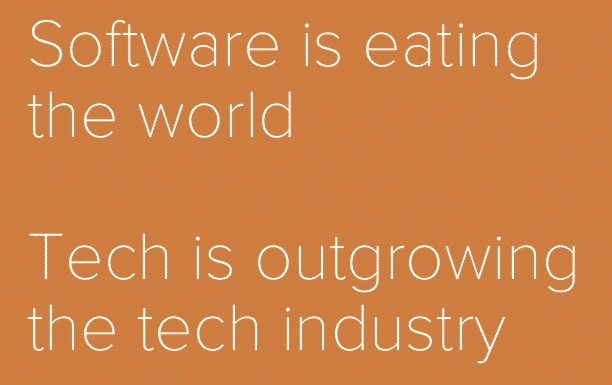How Mobile Changes Everything
This is a powerful presentation by Andreessen Horowitz about how much mobile is changing technology. Here are my takeaways and analysis.
By 2020, 80% of humans on earth will have a smartphone
On iPhone 6 launch weekend, Apple sold 25x the CPU transistors that existed on earth in 1995
The poorer a group is, the more important mobile is to them
4 billion buy smartphones every 2 years, where 1.6 billion people buy a PC every 5 years
Smartphones and tablets are nearly half of the consumer electronics industry
Microsoft went from 90% computing dominance to 20% in just 6 years because they didn’t get into mobile
China is by far the largest Smartphone market
Chinese consumers want Chinese phones, not foreign ones (except Apple)
Mobile doesn’t just mean mobile; mobile devices are becoming our go-to computing environment
Internet used to mean web browsers, mouse, and keyboard, and now half of all online time is spent inside of apps
Computers didn’t have sensors. Sensors change what a device can know. Every sensor creates a new business
2 to 3x more Smartphones than PCs by 2020
Everywhere access x sensors x cameras x location x payment x social = vastly bigger opportunity
Facebook now makes 68% of its ad revenue from mobile (7.4 billion in 2014)
Global SMS is 20 billion messages per day. WhatsApp does 30 billion with 40 engineers
Computing devices are eclipsing TV sets
In 1999 80 billion consumer photos were taken on film. In 2014 800 billion photos were shared on social
More iPhones and Androids have been sold than Japanese cameras, ever
More photos taken this year on Smartphones than on film, ever
Three phases of tech deployment: companies that make technology, companies that buy technology, and companies that are built around technology
10 years ago, AirBnB would have sold software to Hilton, and Uber would have sold software to Taxi companies. Today they use that software to compete with them directly
Analysis
The three biggest impacts of this presentation for me were:
Half of all online time is spent in applications, not a browser
Facebook makes 68% of its ad money from mobile
The businesses of the future will disrupt by going directly to users with their tech instead of selling that tech to middle businesses
In my opinion the real story isn’t the mobile piece, it’s the potential Ubering and AirBnB’ing of existing business models. And mobile is what enables this to happen.
Basically, because everyone will have a smartphone, future businesses will just come directly to them instead of through other companies. And if you think about that it makes sense.
In the past we needed gathering points because there was no way to reach people directly. You want a cruise? Go to a travel agent. You want to find an employee? Go to a recruiter.
But all that is going away, which is something I write about a lot >. Basically, a tech layer, similar to Uber’s platform, will connect people and businesses transparently, and this can only happen because of mobile.

This is why mobile (and software) is eating the world. It’s because most of the world was brokers and facilitators, and now they’re no longer needed.
Definitely one of the best presentations on the future of technology that I’ve ever seen.
Notes
There are (and will continue to be) many cases where a broker or middle person will add value, but they will do so within the direct (Uber) model as much as possible. The more a business requires you to deviate from that model for them to make money, the more danger they’re in.
The original presentation was Why Software is Eating the World >, which is also phenomenal if you haven’t read it.